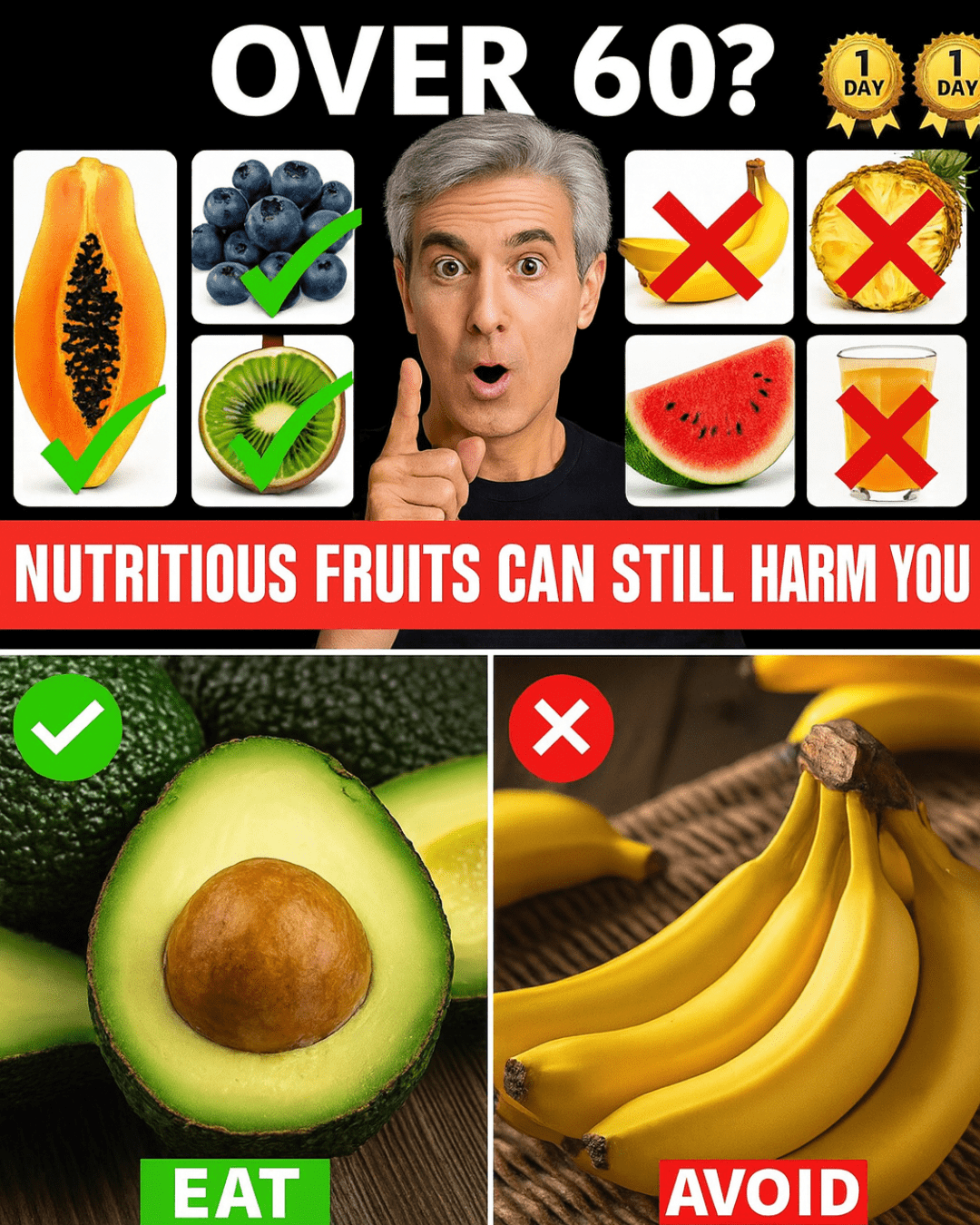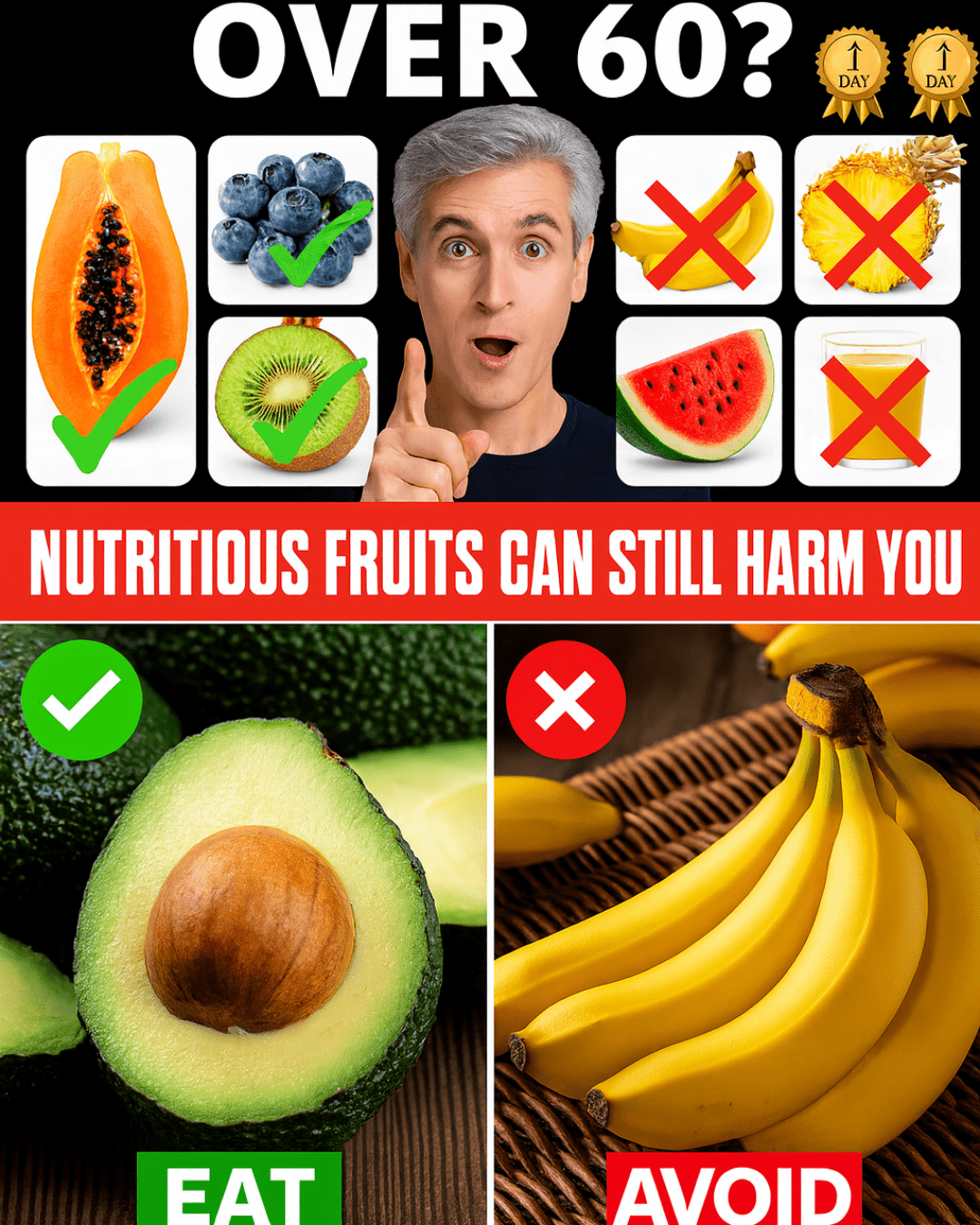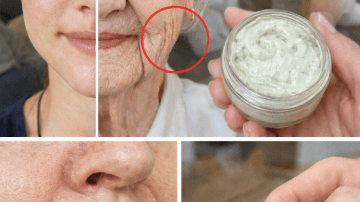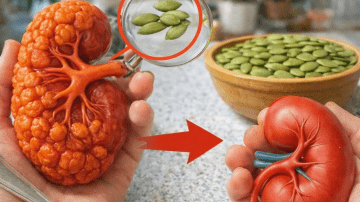For decades, we’ve been told that all fruits are universally healthy. However, as the body ages, its metabolic machinery and vital organ functions shift dramatically. A fruit that is perfectly healthy for a younger adult can become a hidden health hazard for seniors, potentially causing dangerous drug interactions, severe blood sugar spikes, or even physical complications like choking.

For older adults, especially those managing chronic conditions like hypertension, diabetes, or kidney disease, dietary choice is not just about nutrition—it’s about precision and safety. Ignoring these subtle risks can compromise medication efficacy and increase vulnerability to serious illness.
Ready to make crucial dietary adjustments for your safety and longevity? Read on to uncover the top 11 fruits that seniors should avoid or severely limit, and learn the safer, nutrient-dense alternatives that will protect your health without sacrificing flavor.
🚩 11 Critical Fruits That Pose Risks for Seniors
1. 🍊 Grapefruit: The Medication Saboteur
- The Risk: Grapefruit contains furanocoumarins, compounds that inhibit the enzyme CYP3A4 in the liver. This enzyme is responsible for metabolizing many common prescription drugs.
- The Danger: Inhibiting CYP3A4 causes medications (including those for high blood pressure, cholesterol, and heart disease) to build up to dangerously high, toxic levels in the bloodstream.
- ✅ Safer Alternative: Oranges or Tangerines. They provide the same Vitamin C boost without the critical drug interaction risk.
2. 🍌 Bananas: The Potassium Overload
- The Risk: Bananas are extremely high in Potassium. While healthy for most, this is hazardous for seniors with impaired kidney function.
- The Danger: Damaged kidneys struggle to filter excess Potassium, leading to hyperkalemia. This condition can cause muscle weakness, numbness, and irregular, life-threatening heart rhythms.
- ✅ Safer Alternative: Apples or Berries. They are lower in potassium but still rich in fiber and antioxidants.
3. 🍇 Dried Fruits (Raisins, Dates, Prunes): The Sugar Bomb
- The Risk: The process of drying concentrates the natural sugars and calories, removing most of the water.
- The Danger: Causes rapid and severe blood sugar spikes, making them highly risky for seniors with diabetes or insulin resistance. Their sticky texture also heightens the risk of cavities.
- ✅ Safer Alternative: Fresh Pears or Peaches. Provides sweetness, fiber, and hydration without the concentrated sugar load.
4. 🥭 Mangoes: The Glycemic Spike
- The Risk: Mangoes are high in natural sugars (fructose) and moderate in fiber.
- The Danger: For seniors with compromised metabolic function, mangoes can cause sudden, sharp blood sugar spikes, leading to fatigue and metabolic stress.
- ✅ Safer Alternative: Blueberries or Raspberries. These are low on the glycemic index and packed with stabilizing fiber.
5. 🍍 Pineapple: The Acidity Trigger
- The Risk: Pineapple is highly acidic due to its rich citric acid content.
- The Danger: Can easily irritate the sensitive stomach lining common in older adults and trigger or worsen acid reflux (GERD) or gastritis.
- ✅ Safer Alternative: Cantaloupe or Honeydew Melons. These have a higher pH, making them gentler and soothing for the stomach.

6. 🫐 Cherries: The Sugar Concentration
- The Risk: Although full of anti-inflammatory antioxidants, cherries are dense in natural sugars.
- The Danger: Like dried fruits and mangoes, their high sugar load can cause blood sugar levels to rise too quickly, making them a less ideal choice for diabetic seniors.
- ✅ Safer Alternative: Strawberries (lower sugar content) or Tart Cherries (lower sugar, higher anti-inflammatory compounds).
7. 🍇 Whole Grapes: The Choking Hazard
- The Risk: The small, firm, and spherical shape of whole grapes makes them a significant choking hazard, especially for seniors who may have difficulty chewing or swallowing (dysphagia).
- The Danger: Presents a physical risk of airway blockage.
- ✅ Safer Alternative: Melon Cubes or Soft, Sliced Apples (with the core removed). Always cut foods into small, manageable pieces.
8. ⭐ Starfruit: The Kidney Toxin
- The Risk: Starfruit (Carambola) contains concentrated oxalate and a neurotoxin.
- The Danger: For seniors with even mild kidney dysfunction, the kidneys struggle to remove these compounds, leading to serious complications like confusion, seizures, or irreversible kidney failure.
- The Rule: Starfruit must be avoided entirely by anyone with pre-existing kidney issues.
9. 🥑 Avocados: The Fat and Calorie Density
- The Risk: While containing “healthy fats,” avocados are extremely high in calories and fat content per serving.
- The Danger: For seniors who need to manage their weight, control caloric intake, or are following a specific low-fat protocol, the high-calorie density can easily be over-consumed.
- ✅ Safer Alternative: Cucumbers or Leafy Greens. Provides hydration and fiber without the heavy caloric load.
10. 🍒 Lychees: The Hypoglycemia Risk
- The Risk: Lychees contain compounds that can interfere with the body’s ability to produce glucose.
- The Danger: Eating them (especially unripe ones) on an empty stomach can cause dangerous, sudden drops in blood sugar (hypoglycemia), a critical risk for diabetic seniors.
- ✅ Safer Alternative: Watermelon or Papaya (in moderation), which are gentler hydrators.
11. 🍑 Persimmons: The Digestive Obstruction Risk
- The Risk: Persimmons contain high levels of tannins and fiber.
- The Danger: In large amounts, or if not fully ripe, the tannins can form a sticky mass (bezoar) in the stomach, leading to intestinal blockages—a serious risk for seniors with slower digestive motility.
- ✅ Safer Alternative: Kiwi or Berries, which are gentle and aid digestion.
🛑 Final Thoughts: Eat Smart, Stay Safe
For seniors, mindful eating is essential for safety and longevity. By avoiding these 11 risky fruits and choosing safer, nutrient-dense alternatives, older adults can still enjoy the immense benefits of fruit while protecting their cardiovascular, renal, and digestive health.
Key Takeaway: Always prioritize safety. Seniors must consult their doctor or pharmacist before making major dietary changes, especially regarding Grapefruit and any fruit high in Potassium (if renal issues are present). Eat smart. Stay safe. Age vibrantly.






